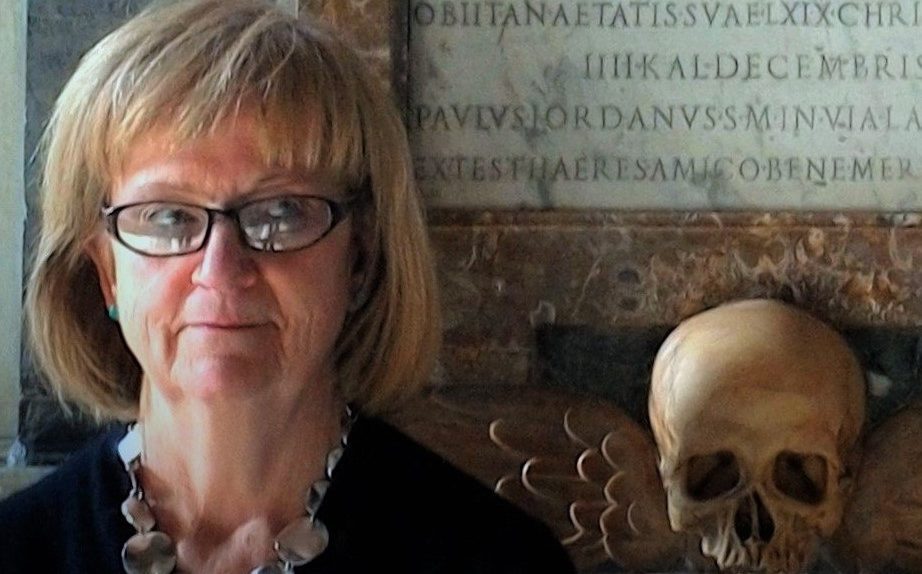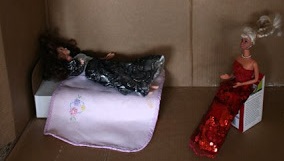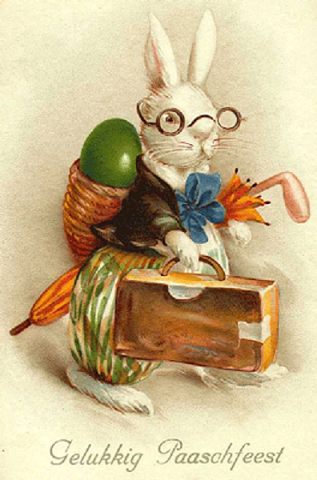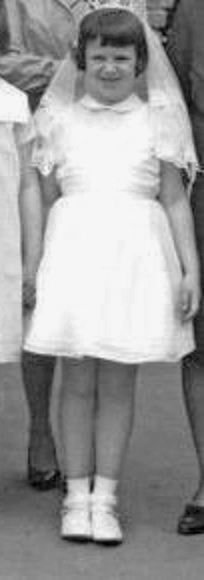
My sister Susan was always a More Fully Well Rounded Person than I was; she actually paid attention in school, volunteered at a camp for disabled children, competed in Debate and Speech events, and participated in school theater. She could not sing, but she always snagged the largest non-singing part in plays. I was her adoring and devoted audience; whereas my parents went to one performance of each play and forced my brothers to do the same, I found a way (tricky, since I was much too young to drive) to attend every performance. I was the Adoring Audience. And really, once you’ve snagged a stage, a company, a set and a script, what is more important than an Adoring Audience? I knew my part, and I played it well.
Watching Susan on stage over the years and seeing how much fun she was having, I started to recall my own triumphant turn as a gypsy in my second grade ballet recital (here)That memory inspired me to put my disastrous Drama Class Adventure behind me (here)and audition for the seventh grade Christmas Play at Christ King School.
I was cast, and in a major role. This was well before the days of “participation ribbons” and the philosophy of “everybody wins,” so being cast as one of the leads was a real coup. All of the girls and even many of the boys tried out, so there were quite a few disappointed seventh graders. For once, I was not one of them. I have no idea what the title of that Christmas play was, nor who wrote it. I do know that it was not a very good play, so it is possible that Sr. Collette wrote it herself. Sr. Collette loved to engage in creative activities, but her efforts often fell short of whatever mark she was aiming at. Earlier that year, for example, she had decided to create a filmstrip about “The Joy of Reading,” starring the entire class. In this film, each of us wore a giant board with a letter on it and walked around forming words with our bodies accompanied by the song “Celebrate.” (For those who missed the 1960’s, the lyrics were “Celebrate! Celebrate! Dance to the Music!”) I am unclear as to what Sister’s vision was for this project, but I could tell when we watched the completed film that we had not achieved it.
Wherever it came from, the seventh grade contribution to the Christmas Pageant was a one act play with a short running time; there were eight other acts to get through in one afternoon, after all. I was the Spirit of Love. I do not remember who played the other two parts; in fact, I don’t know what the other two parts even were, although I assume they were the Spirit of Hope and the Spirit of Faith. My part consisted in gliding onto the stage at some point, dressed in an ethereal white robe, and giving a misty speech about love to a little boy lying in a bed. I don’t remember why he was in the bed, but I assume that the action was taking place on Christmas Eve a la A Christmas Carol, and the little fellow was going to learn some important life lessons from his Spirit Visitors.
In order to achieve the “ethereal” effect, Sr. Collette arranged with Mr. Keeley, the Christ King Choir Director (and a very intimidating man) to borrow three long white choir robes from the Christ King Choir. Mr. Keeley agreed reluctantly to let Sr. Collette use the robes, but he pounded into her the warning that nothing must happen to these robes. On the day of the dress rehearsal for the play, we three Spirits of Something got to put on our robes, and—even more exciting—we rehearsed in full makeup. The little boy in the bed didn’t get any makeup, but then he didn’t have any lines, either. We three Spirits, however, were decked out in vivid pink cheeks and red lipstick.
I don’t remember the rehearsal itself, but it must have gone just fine, because whenever anything didn’t go well in our seventh grade classroom, Sr. Collete would become memorably angry. She had an Artistic Temperament. After rehearsal, we three Spirits ducked into the cloakroom to disrobe and rejoin the dull world of People Who Aren’t in Theater. As I was taking the Very Expensive Choir Robe off over my head, I caught the front of it with my fully lipsticked lips, leaving a sizable smear right on the front of the robe. It looked like the Spirit of Love had been attacked by a knife-wielding maniac.
Seeing the impressive red slash on Mr. Keeley’s Choir Robe, my two Spirit castmates gasped and ran out of the room as fast as they could. One of them (who in that moment was definitely channeling the Spirit of Tattling) yelled out to Sr. Collette that “Maloney messed up Mr. Keeley’s Robe!” I stood there in stunned disbelief, looking down at my sorry choir robe and coming to grips with what had just happened, dreading the moment that Sister found out what I did. Sure enough, Sr. Collette swooped into the room, a black and white blur of rage.
No doubt Sister herself was terrified of Mr. Keeley; we all were, but I was also terrified of Sr. Collette, and never more than in that moment. When she saw the red lipstick smear on the robe, she hauled off and slapped me right across the face, as hard as she could, and she was not a frail woman. I never questioned her response; I knew that I had—accidentally, but still—committed a dark deed, and no doubt betrayed any trust she had in my ability to For Once Not Screw Up.
I never told anyone that Sr. Collette hit me. I was relieved that we were in the cloakroom and no one else saw it; I was at least spared a public humiliation. Also, I really didn’t blame her. I knew that she was now in deep trouble with Mr. Keeley, and it was my doing. Sister tried the best she could to get the lipstick stain out with cold water, and after her ministrations it was reduced to a faint pink blur. Surely (we hoped) the mark would be invisible to the audience while I was on stage. Neither of us held out any hope that the same would be true of Mr. Keeley.
The Christmas Program took place during the afternoon; in those days, evening events were unheard of, since our teachers thought that our parents deserved relaxing evenings at home after their day’s work rather than having to haul themselves up to school to watch their children do things badly on stage. Those parents who were at home during the day were welcome to come and stand in the back of the gymnasium, but very few parents did so. My mother had told me that she would try to get there to witness my triumphant stage debut, and my sister Susan was planning to come as well. (She must have had the day off from high school, as she would never have been allowed to miss school for a grade school pageant.) The Program started at 1 p.m., and as soon as the curtain went up, I started looking for my mother and Susan to appear. As the moments ticked by and there was no sign of them, I got more and more anxious.
As the program marched inexorably onward, the time came for the seventh grade to take the stage. No sign of my mother; no sign of my sister. Still, I knew that the Show Must Go On. I stepped out onto the stage when my cue came and spoke my lines with confidence, as if to say to my audience, “Ignore that pink smear on the Spirit of Love’s ethereal white robe. Attend only to the profound words issuing forth from the Spirit of Love.”
Susan and my mother missed my star turn, and they felt terrible about it. My mother was taking care of my other sister Marbeth’s baby that day, and Marbeth was caught in traffic and late to pick her up. My mother had four other children and several grandchildren, and I knew she was juggling a lot of balls. I comforted myself with the knowledge that I had, at the moment I needed to, stepped up and given my performance. I was also very glad that it was Sr. Collette and not I who had to bring those robes back to the formidable Mr. Keeley.



 My mother worried continuously over my lack of friends and my weight. I loved to read, and I was content to lay on the cot in our basement every day after school and all through the summers with a bag of forbidden chocolate at my side, reading my parents’ collection of Reader’s Digest Condensed Books and whatever else I could find on our shelves. While my mother wished I were less in love with chocolate and would have loved to see me pursuing more physical-fitness oriented activities, she thoroughly understood my love of books. We always shared that passion, and it was a good one to have in common.
My mother worried continuously over my lack of friends and my weight. I loved to read, and I was content to lay on the cot in our basement every day after school and all through the summers with a bag of forbidden chocolate at my side, reading my parents’ collection of Reader’s Digest Condensed Books and whatever else I could find on our shelves. While my mother wished I were less in love with chocolate and would have loved to see me pursuing more physical-fitness oriented activities, she thoroughly understood my love of books. We always shared that passion, and it was a good one to have in common.
 She even had a boyfriend, Ned Nickerson. Trouble always found Nancy, but she prevailed in the end, and she didn’t need parents or a boyfriend to do it. Nancy was smart and independent and I loved her.
She even had a boyfriend, Ned Nickerson. Trouble always found Nancy, but she prevailed in the end, and she didn’t need parents or a boyfriend to do it. Nancy was smart and independent and I loved her. I more or less memorized Mrs. Mike, and to this day I recall its images and anecdotes at various moments in my own life. No book quite took over my life, however, the way that Heidi did.
I more or less memorized Mrs. Mike, and to this day I recall its images and anecdotes at various moments in my own life. No book quite took over my life, however, the way that Heidi did. I wanted to be in Heidi’s world, which is odd, since Heidi’s world included being abandoned to live with her grandfather, a very grouchy and distant old man, sleeping in a hut on a desolate mountain with this old man, building a loving connection with that same man through pure resilience and good humor only to be taken away without notice to serve as a companion to a rich crippled girl named Klara whose housekeeper despised Heidi…THIS was the world I wanted to leave my world for? Yes.
I wanted to be in Heidi’s world, which is odd, since Heidi’s world included being abandoned to live with her grandfather, a very grouchy and distant old man, sleeping in a hut on a desolate mountain with this old man, building a loving connection with that same man through pure resilience and good humor only to be taken away without notice to serve as a companion to a rich crippled girl named Klara whose housekeeper despised Heidi…THIS was the world I wanted to leave my world for? Yes. I didn’t realize until many years later that Marjorie had not actually been all that talented, that her own dreams of being an actress and an unconventional woman had been risible given her clear status as a typical Jewish girl of her time.
I didn’t realize until many years later that Marjorie had not actually been all that talented, that her own dreams of being an actress and an unconventional woman had been risible given her clear status as a typical Jewish girl of her time. homework I did turn in that month was not very good. I was doing nothing to improve my solid “D” average in science and math; my reading and spelling scores were good because I didn’t have to study them to excel. Even my reading grade plummeted, though, when I had to turn in an art project about a book I had read. My task was to create a diorama about a book I had enjoyed and, lacking any artistic talent whatsoever, I dressed my Barbie doll in her best dress, put her in a box, and said she was Scarlett O’Hara. I got a D. The diorama next to mine was created by Dianne, a girl I had never seen read an entire book in her life, and she had a scene from Hans Brinker and the Silver Skates, with a pond made from a mirror and realistic looking snow. She got an A.
homework I did turn in that month was not very good. I was doing nothing to improve my solid “D” average in science and math; my reading and spelling scores were good because I didn’t have to study them to excel. Even my reading grade plummeted, though, when I had to turn in an art project about a book I had read. My task was to create a diorama about a book I had enjoyed and, lacking any artistic talent whatsoever, I dressed my Barbie doll in her best dress, put her in a box, and said she was Scarlett O’Hara. I got a D. The diorama next to mine was created by Dianne, a girl I had never seen read an entire book in her life, and she had a scene from Hans Brinker and the Silver Skates, with a pond made from a mirror and realistic looking snow. She got an A. for the train ride to Milwaukee from Chicago. My mother was a bit dubious given the somewhat racy-looking cover, and asked me what it was about. “The airline industry,” I said. “You know, how hard it is to be a stewardess or a pilot.” Reassured, she gave me the money to buy the book, and I read it happily all the way home.
for the train ride to Milwaukee from Chicago. My mother was a bit dubious given the somewhat racy-looking cover, and asked me what it was about. “The airline industry,” I said. “You know, how hard it is to be a stewardess or a pilot.” Reassured, she gave me the money to buy the book, and I read it happily all the way home. I had been in no shape to look through it while I was in the hospital, but I certainly looked forward to perusing it once I got home. One day while she was visiting me, however, my mother started paging through the book while I was napping. I awoke to a very irate mother, who had some rather unfavorable things to say about Jolie. “Who would give such a book to a twelve year old girl?” was, I believe, among them. “The first page I opened to had a picture of two women. Dancing. With each other. And they were both in the nude!” Our Bodies, Ourselves went home that day under my mother’s arm, and in order to read it weeks later, I had to find it on her closet shelf.
I had been in no shape to look through it while I was in the hospital, but I certainly looked forward to perusing it once I got home. One day while she was visiting me, however, my mother started paging through the book while I was napping. I awoke to a very irate mother, who had some rather unfavorable things to say about Jolie. “Who would give such a book to a twelve year old girl?” was, I believe, among them. “The first page I opened to had a picture of two women. Dancing. With each other. And they were both in the nude!” Our Bodies, Ourselves went home that day under my mother’s arm, and in order to read it weeks later, I had to find it on her closet shelf.
 Second grade was the year that we made our First Confession at Christ King School. I was in the second grade in 1966, so the changes wrought by Vatican II were still two years away for us. Sister Shawn Marie and Fr. Lippert did their best to make this process reassuring; Father visited class and practiced the routine with us (“Bless me, Father, for I have sinned. This is my — confession. Here are my sins: —–I am sorry for these and all my sins, especially for all the times I —–.”) Each student was in charge of enumerating her own venial sins, but for some reason that is not clear to me it was decided that Sr. Shawn Marie would supply us with what is called our “principal fault,” or the sin that came after “…especially for all the times I —-.” When it was my turn to sit next to Sister’s desk, I ran through the whole script with her and when I got to the “especially….” part, Sister supplied the words, “….for all the times I was lazy.” I remember thinking, “Huh. Did not see that coming. Lazy. Is that even a sin?”
Second grade was the year that we made our First Confession at Christ King School. I was in the second grade in 1966, so the changes wrought by Vatican II were still two years away for us. Sister Shawn Marie and Fr. Lippert did their best to make this process reassuring; Father visited class and practiced the routine with us (“Bless me, Father, for I have sinned. This is my — confession. Here are my sins: —–I am sorry for these and all my sins, especially for all the times I —–.”) Each student was in charge of enumerating her own venial sins, but for some reason that is not clear to me it was decided that Sr. Shawn Marie would supply us with what is called our “principal fault,” or the sin that came after “…especially for all the times I —-.” When it was my turn to sit next to Sister’s desk, I ran through the whole script with her and when I got to the “especially….” part, Sister supplied the words, “….for all the times I was lazy.” I remember thinking, “Huh. Did not see that coming. Lazy. Is that even a sin?” all those relaxed second graders who had already been there and done that. I sat in the pew and ran through the script in my head, trying to remember the right words and where to plug in my sins. After not nearly enough time had passed, Theresa Buth opened the heavy wooden door of the confessional and nodded at me to enter. I gulped and walked inside the little dark room. Best to just launch in, get it done and exit with as much panache as possible, I decided, so I knelt down and said the whole thing in one big breath: “BlessmefatherforIhavesinnedherearemysins…..” etc. Just as I was finishing up I heard a scrapy, sliding sound in front of my face and suddenly a kind male voice said, “You may begin.” Begin? I had just done the whole thing! Where was HE?” He was, of course, on the other side of the confessional. I closed my eyes in resignation and started over: “BlessmefatherforIhavesinned…” I remembered everything I had planned to say; I did not, however, confess being lazy as my major sin, as Sister had instructed me. I had decided, all on my own, that my Big Sin in the last action-packed seven years was stealing a holographic block from Patty Goodnetter. The block I had stolen was so attractive to me because the pictures kept changing, just like a television set. Not knowing the words “holographic block” at the age of seven, I cut to the chase and confessed to Father that I had stolen a television set.
all those relaxed second graders who had already been there and done that. I sat in the pew and ran through the script in my head, trying to remember the right words and where to plug in my sins. After not nearly enough time had passed, Theresa Buth opened the heavy wooden door of the confessional and nodded at me to enter. I gulped and walked inside the little dark room. Best to just launch in, get it done and exit with as much panache as possible, I decided, so I knelt down and said the whole thing in one big breath: “BlessmefatherforIhavesinnedherearemysins…..” etc. Just as I was finishing up I heard a scrapy, sliding sound in front of my face and suddenly a kind male voice said, “You may begin.” Begin? I had just done the whole thing! Where was HE?” He was, of course, on the other side of the confessional. I closed my eyes in resignation and started over: “BlessmefatherforIhavesinned…” I remembered everything I had planned to say; I did not, however, confess being lazy as my major sin, as Sister had instructed me. I had decided, all on my own, that my Big Sin in the last action-packed seven years was stealing a holographic block from Patty Goodnetter. The block I had stolen was so attractive to me because the pictures kept changing, just like a television set. Not knowing the words “holographic block” at the age of seven, I cut to the chase and confessed to Father that I had stolen a television set.


 rite only about sports. After several failed attempts to propose stories about other things, I finally proposed a sort of “how-to” column about how to make cool stuff. “Like what?” one of the boys asked skeptically. I racked my brain and remembered seeing an article in one of my teen girl magazines about making a candle that looked like a glass of beer. I hadn’t read the article, knowing that my mother would never let me make a beer candle even if I wanted to, which I didn’t. Thinking (correctly) that this was a “how-to” project that boys might like, I proposed it. The boys immediately agreed that I should write an article about how to make a beer candle.
rite only about sports. After several failed attempts to propose stories about other things, I finally proposed a sort of “how-to” column about how to make cool stuff. “Like what?” one of the boys asked skeptically. I racked my brain and remembered seeing an article in one of my teen girl magazines about making a candle that looked like a glass of beer. I hadn’t read the article, knowing that my mother would never let me make a beer candle even if I wanted to, which I didn’t. Thinking (correctly) that this was a “how-to” project that boys might like, I proposed it. The boys immediately agreed that I should write an article about how to make a beer candle.

 I thought no more about it until about six days later, when one of the quieter, nicer boys in my class called me on the telephone. I couldn’t imagine why he would call me, but I soon found out. “Um, hello? So, I’m making the Beer Candle you wrote about in the Christ King Kingly News, and I think I did something wrong, because it’s all kind of a mess and I can’t get the wax out of my mother’s electric mixer.” My stomach plummeted. It had simply never occurred to me that someone would actually take something that I had written seriously. I had not envisioned the possibility that anyone would actually try to make this candle. I felt awful. I couldn’t tell him at that point, his mother’s mixer encased in wax and God knows what mess in his kitchen, that I had made the entire thing up. I took the only open path I saw open to me: I faked it. I told him some gibberish about the process and got off the phone as quickly as I could. I felt terrible. I have never forgotten that young man, and I had learned a powerful lesson in the Responsibility of the Press.
I thought no more about it until about six days later, when one of the quieter, nicer boys in my class called me on the telephone. I couldn’t imagine why he would call me, but I soon found out. “Um, hello? So, I’m making the Beer Candle you wrote about in the Christ King Kingly News, and I think I did something wrong, because it’s all kind of a mess and I can’t get the wax out of my mother’s electric mixer.” My stomach plummeted. It had simply never occurred to me that someone would actually take something that I had written seriously. I had not envisioned the possibility that anyone would actually try to make this candle. I felt awful. I couldn’t tell him at that point, his mother’s mixer encased in wax and God knows what mess in his kitchen, that I had made the entire thing up. I took the only open path I saw open to me: I faked it. I told him some gibberish about the process and got off the phone as quickly as I could. I felt terrible. I have never forgotten that young man, and I had learned a powerful lesson in the Responsibility of the Press.
 On that particular day, I didn’t stop to look at the Relic, the pictures, or anything else in the drawer. I spied the rosary, scooped it up, put it in its black zippered rosary case, and brought it to school with me the next day. I figured I would have the best rosary in the class, no doubt attracting the envy of the other girls, who would see this classy silver rosary, realize what an intriguing and desirable girl I was to have such a rosary, and instantly start vying for my attention and friendship. I would wave the silver rosary around (discreetly, of course, like the future saint I almost certainly was), perhaps even letting some of the girls hold it for a minute or two.
On that particular day, I didn’t stop to look at the Relic, the pictures, or anything else in the drawer. I spied the rosary, scooped it up, put it in its black zippered rosary case, and brought it to school with me the next day. I figured I would have the best rosary in the class, no doubt attracting the envy of the other girls, who would see this classy silver rosary, realize what an intriguing and desirable girl I was to have such a rosary, and instantly start vying for my attention and friendship. I would wave the silver rosary around (discreetly, of course, like the future saint I almost certainly was), perhaps even letting some of the girls hold it for a minute or two. zippered. It was open. It was upside down in my hand. And the rosary was gone. In an instantaneous black panic, I rushed up to Sr. Shawn Marie and told her that I had lost my rosary on the way back from church and could I please go and look for it? Sister said yes, I could look in the hallway but should come right back whether I found it or not.
zippered. It was open. It was upside down in my hand. And the rosary was gone. In an instantaneous black panic, I rushed up to Sr. Shawn Marie and told her that I had lost my rosary on the way back from church and could I please go and look for it? Sister said yes, I could look in the hallway but should come right back whether I found it or not.